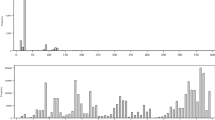Abstract
In this article, we explore the impact of electoral participation on electoral dynamics in Quebec. We propose a parsimonious model that considers the linguistic composition of districts and the effective electoral support for parties to explain electoral politics. In modeling these dynamics, we introduce three new concepts, namely leverage effect, push effect, and differentiation effect. Our findings show that the 2018 election represents an extension of dynamics established in 2012 and played a corrective role to those of the 2014 election. They also demonstrate that leverage effects are not effective mechanisms for ensuring electoral success.







Similar content being viewed by others
Notes
Trend estimates for all parties were obtained via linear regression with a simple trend variable (election year) and an intercept as explanatory factors. The full table is available upon request.
Univariate linear model. Available upon request.
The number of observations is slightly reduced because there are instances where the four major parties did not field candidates.
References
Beauregard, K. 2016. At the Intersection of Gender and Language: Why Do Francophone Women Have Lower Levels of Political Participation? American Review of Canadian Studies 46 (1): 74–92.
Bélanger, É., and R. Nadeau. 2009. Le comportement électoral des Québécois. Montréal: Presses de l’Université de Montréal.
Blais, A., E. Gidengil, N. Nevitte, and R. Nadeau. 2004. Where Does Turnout Decline Come From? European Journal of Political Research 43: 221–236.
Boonen, J. 2019. Learning Who Not to Vote for: The Role of Parental Socialization in the Development of Negative Partisanship. Electoral Studies 59: 109–119.
Boucher, M.T. 2014. Political Reflections on a Homecoming: The Québec Election of April 2014. Québec Studies 58: 123–138.
Cancela, J., and B. Geys. 2016. Explaining Voter Turnout: A Meta-analysis of National and Subnational Elections. Electoral Studies 42: 264–275.
CECD. 2016. New Analysis of the 2015 National Youth Survey. Inspire Democracy. http://inspirerlademocratie-inspiredemocracy.ca/rsch/yth/yp/index-eng.asp. Accessed 17 Feb 2019.
Champagne, D. 2014. PKP, le multimillionnaire qui veut devenir premier ministre. Radio-Canada. https://ici.radio-canada.ca/nouvelle/693272/pkp-huit-mois-politique-active. Accessed 17 Feb 2019.
Converse, P.E. 1964. The Nature of Belief Systems in Mass Publics. Critical Review 18 (1–3): 1–74.
Crête, J. 1984. Comportement électoral au Québec. Chicoutimi: Gaétan Morin.
Daoust, J.-F., and A. Blais. 2017. How Much Do Voters Care About the Electoral Outcome in Their District? Representation 53 (3–4): 233–246.
Dufour, P., and L.-P. Savoie. 2014. Quand les mouvements sociaux changent le politique. Le cas du mouvement étudiant de 2012 au Québec. Canadian Journal of Political Science 47 (3): 475–502.
Duval, D. (2005) Recension des écrits sur la participation électorale. Études électorales. DGEQ
Gélineau, F. and A. Morin-Chassé. 2009. Les motifs de la participation électorale au Québec: une étude de l’élection de 2008. Chaire de recherche sur la démocratie et les institutions parlementaires. Cahiers de recherche électorale et parlementaire no. 1.
Geys, B. 2006. Explaining Voter Turnout: A Review of Aggregate-Level Research. Electoral Studies 25 (4): 637–663.
Guay, J.-H., and S. Gaudreau. 2018. Les élections au Québec. 150 ans d’une histoire mouvementée. Québec: Presses de l’Université Laval.
Laakso, M., and R. Taagepera. 1979. “Effective” Number of Parties: A Measure with Application to West Europe. Comparative Political Studies 12 (1): 3–27.
Lavoie, M., and M. St.-Germain. 1991. Disparités linguistiques de revenu au Canada selon la langue parlée à la maison. L’ActualitéÉconomique 67 (3): 356–380.
Mahéo, V.-A., and É. Bélanger. 2018. Is the Parti Québécois Bound to Disappear? A Study of the Current Generational Dynamics of Electoral Behaviour in Quebec. Canadian Journal of Political Science 51 (2): 335–356.
Maioni, A. 2014. The Québec Election of 2014 and the Unresolved Challenges of the Parti Québécois. Quebec Studies 58 (8): 139–152.
Markus, G.B., and P.E. Converse. 1979. A Dynamic Simultaneous Equation Model of Electoral Choice. American Political Science Review 73 (4): 1055–1070.
Meideros, M. 2017. Not Just About Quebec: Accounting for Francophones’ Attitudes Towards Canada. French Politics 15 (2): 223–236.
Neundorf, A., K. Smets, and G.M. Garcia-Albacete. 2013. Homemade Citizens: The Development of Political Interest During Adolescence and Young Adulthood. Acta Politica 48: 92–116.
Noël, A. 2014. Élections 2014: la force des grands clivages idéologiques. Bulletin d’histoire politique 23 (1): 202–207.
Stockemer, D. 2017. What Affects Voter Turnout? A Review Article/Meta-Analysis of Aggregate Research. Government and Opposition 52 (4): 698–722.
Wass, H. 2007. Generations and Socialization into Electoral Participation in Finland. Scandinavian Political Studies 30 (1): 1–20.
Author information
Authors and Affiliations
Corresponding author
Additional information
Publisher's Note
Springer Nature remains neutral with regard to jurisdictional claims in published maps and institutional affiliations.
Rights and permissions
About this article
Cite this article
Bodet, M.A., Villeneuve-Siconnelly, K. Effective support and electoral dynamics in Quebec. Fr Polit 18, 221–237 (2020). https://doi.org/10.1057/s41253-020-00118-6
Published:
Issue Date:
DOI: https://doi.org/10.1057/s41253-020-00118-6




